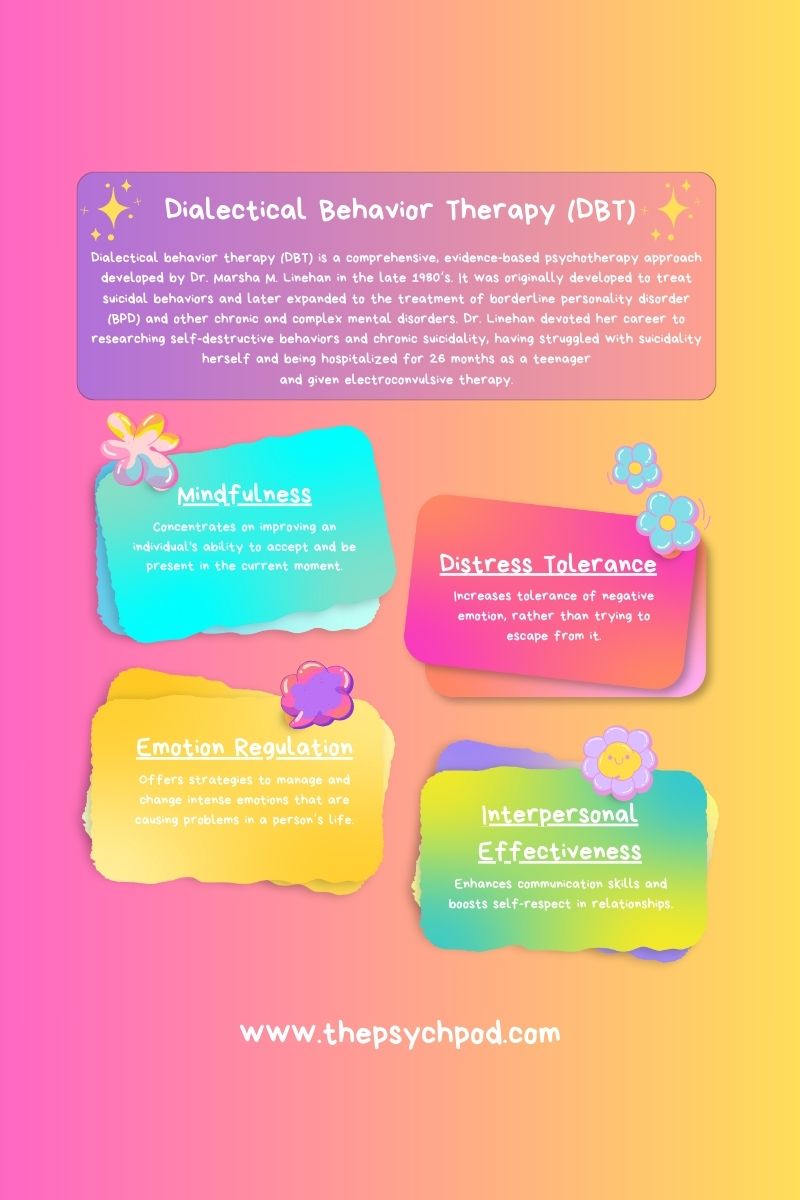Dialectical behavior therapy (DBT) is a comprehensive, evidence-based psychotherapy approach developed by Dr. Marsha M. Linehan in the late 1980’s. It was originally developed to treat suicidal behaviors and later expanded to the treatment of borderline personality disorder (BPD) and other chronic and complex mental disorders. Dr. Linehan devoted her career to researching self-destructive behaviors and chronic suicidality, having struggled with suicidality herself and being hospitalized for 26 months as a teenager and given electroconvulsive therapy.
What DBT Emphasizes:
Mindfulness: Concentrates on improving an individual’s ability to accept and be present in the current moment.
Distress Tolerance: Increases tolerance of negative emotion, rather than trying to escape from it.
Emotion Regulation: Offers strategies to manage and change intense emotions that are causing problems in a person’s life.
Interpersonal Effectiveness: Enhances communication skills and boosts self-respect in relationships.
DBT is unique in its dialectical approach, which emphasizes the balance between acceptance and change. This means therapists and clients work together to accept the realities of the client’s life while simultaneously working on changing negative behaviors and thoughts.
What does a typical DBT session look like?
DBT treatment usually consists of three components: individual therapy, group skills training, and phone coaching. The structure of these components helps ensure that clients learn new skills, manage difficult emotions, and apply what they’ve learned in their daily lives.
Individual Therapy: These weekly one-on-one sessions with a therapist focus on addressing issues that come up in the patient’s life and ensuring that the skills learned are being applied effectively. The therapist and client work together to track problem behaviors and discuss progress, with a strong emphasis on motivational and relational aspects.
Group Skills Training: Also conducted weekly, these sessions resemble a class where patients learn and practice skills together, guided by a trained facilitator. Each group meeting focuses on one of the four core DBT skills. This setting allows patients to learn from each other and provide mutual support.
Phone Coaching: This component is for clients to receive in-the-moment coaching on how to deal with difficult situations as they occur. It’s particularly useful for applying DBT skills to real-world challenges.
During a typical DBT session, whether individual or group, the atmosphere is one of collaboration and support. Therapists treat clients with unconditional positive regard, balancing the need for acceptance with the push for change. The session might begin with a mindfulness exercise, followed by a review of homework from the last session (in skills training), discussion of current challenges and successes, and introduction of new skills or strategies. The therapist or group leader might use various teaching tools, including role-play, worksheets, and discussion, to facilitate learning and application of skills.
DBT’s structured approach, with its blend of acceptance and change strategies, offers a comprehensive toolkit for individuals struggling with emotional regulation, offering them a path towards healing and resilience.
Dr. Velmi, Psy.D.
